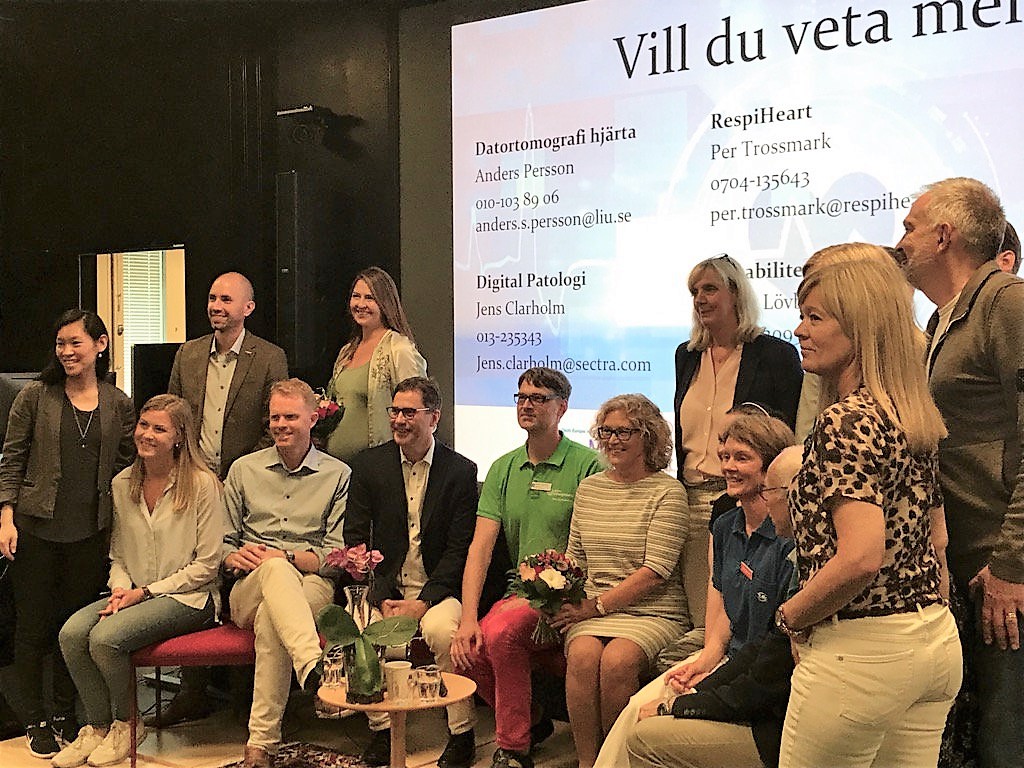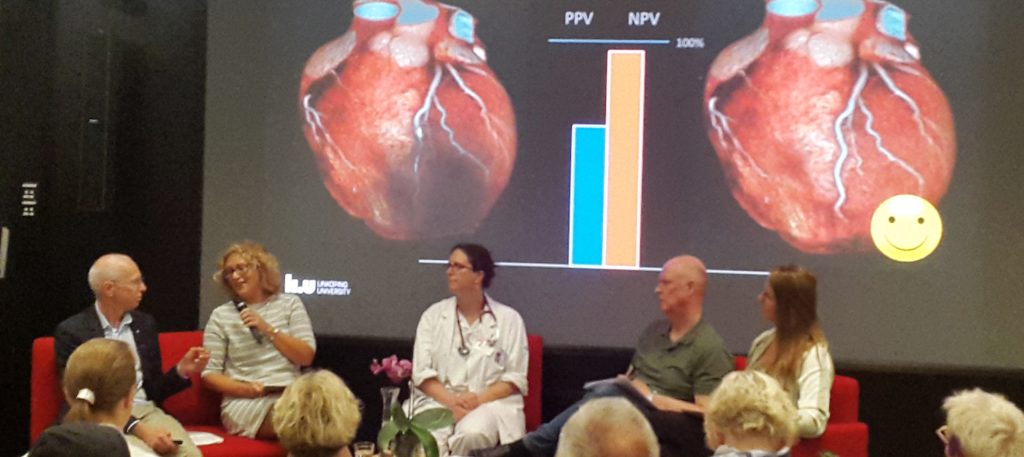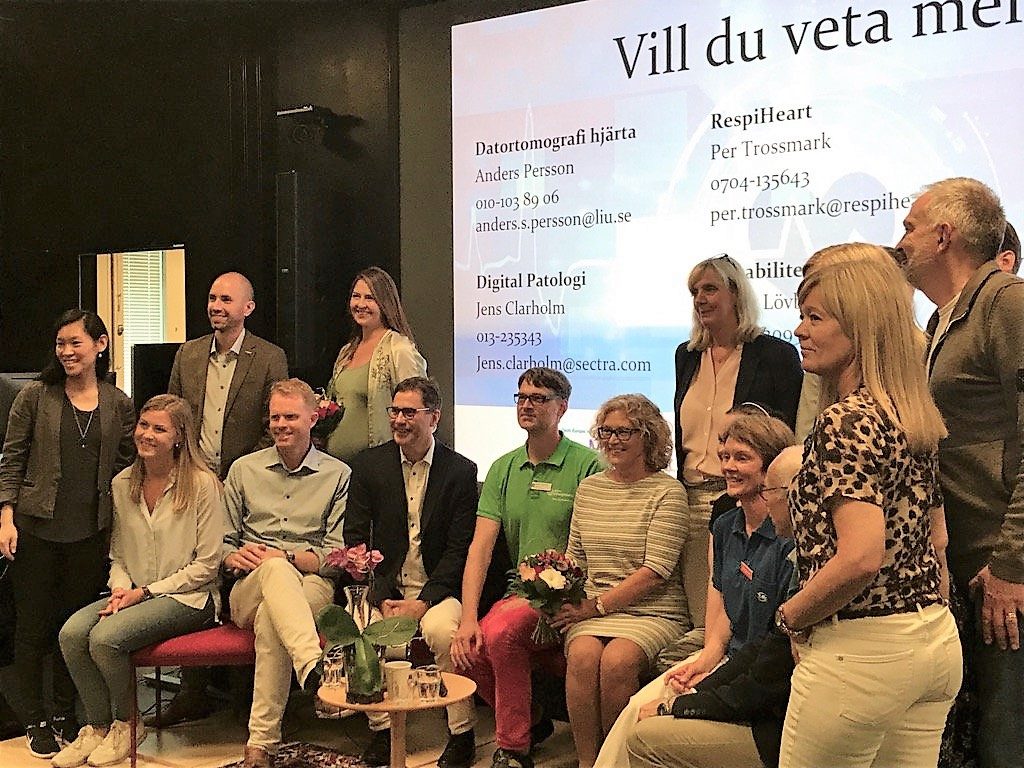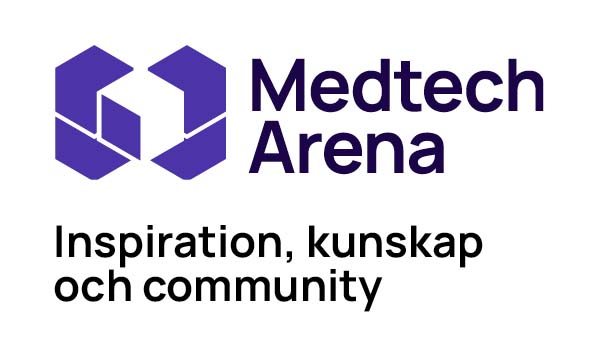
Lkpg petrus DCb0g7pUwAUM8el
An inspirational talk show in Linköping
Linköping took over the baton for the third day of MedTech week. Linköping University Hospital together with Region Östegötland offered us a talk show – a well-composed and inspirational programme. Five teams of three presenters took it in turns to occupy the talk show sofas on stage and present their different projects.
 The first team on stage were Anders Wahl (patient) Sofia Lawesson (cardiologist) and Anders Persson (researcher). Every year 30,000 Swedes suffer heart attacks and 20,000 of these need hospital care. Through computer tomography it is possible to study the function of the heart and coronary arteries. This makes it easier to understand the mechanisms that cause cardiac death, and to predict disease. Through technology, we can be better at deciding what treatment the patient needs.
The first team on stage were Anders Wahl (patient) Sofia Lawesson (cardiologist) and Anders Persson (researcher). Every year 30,000 Swedes suffer heart attacks and 20,000 of these need hospital care. Through computer tomography it is possible to study the function of the heart and coronary arteries. This makes it easier to understand the mechanisms that cause cardiac death, and to predict disease. Through technology, we can be better at deciding what treatment the patient needs.
 The next team up consisted of oncologist Anna-Lotta Hallbeck, pathologist Karin Skoglund and Jens Clarholm, systems developer at Sectra. Their subject was diagnostic pathology, a vital part of diagnosis in cancer care. Diagnostic pathology is a time-consuming job which often involves processing huge amounts of data. With the help of digitalisation, the work process can be streamlined. It becomes easier to browse and share data, call in remote help, compare different tissue samples, quickly measure tumours and count the number of cell divisions.
The next team up consisted of oncologist Anna-Lotta Hallbeck, pathologist Karin Skoglund and Jens Clarholm, systems developer at Sectra. Their subject was diagnostic pathology, a vital part of diagnosis in cancer care. Diagnostic pathology is a time-consuming job which often involves processing huge amounts of data. With the help of digitalisation, the work process can be streamlined. It becomes easier to browse and share data, call in remote help, compare different tissue samples, quickly measure tumours and count the number of cell divisions.
The third item on the programme was RespiHeart. Rani Toll (physician), Joakim Glasin (research nurse) and Per Trossmark (from RespiHeart) showed how it can be made easier to monitor patients in emergency care using new medical technology.
Already in the ambulance, a small device is attached to the patient’s chest. The device provides coherent data on breathing, heart rate and oxygen saturation. The patient then continues to wear the device in hospital. In this way the patient avoids tangled cords, and is facilitated in mobility and toilet visits. In theory the patient would be able to continue using the device even after being discharged from hospital. Monitoring could continue and results could be entered into the patient’s record digitally and automatically and not, as now, manually.
The two final projects presented were both examples of remote healthcare. As is well known, the future will see an imbalance in the number of carers available for the people who will need care. It is important therefore to find new ways of providing healthcare. Both projects were exciting attempts to address this problem.
In the first, Madeleine Gars and Michael Peolsson presented a way to allow patients with Chronic Obstructive Pulmonary Disease (COPD) to take their own samples and send them in to their healthcare provider. The patients together perhaps with relatives then participate in video conferences with the treating physician and healthcare provider where the results are followed up and, if necessary treatment is initiated. This creates security for an exposed patient group and reduces both concern and rehospitalisation.
In summary, one can say that the patients were all in agreement, that remote healthcare gave them a feeling both of security and participation.
The final project demonstrated how to maintain a rehabilitation program for a patient with a knee-injury using a video link. Through the video link Emilia Grebner (patient) and Helén Lövborg (physiotherapist) discussed and followed up exercises.
With this, the day concluded and the talk show host summed up.
 This is a shortened translation from the report by Mia Engman Hyrén (Swedish Medtech) originally published in Swedish on the MedTech4Health website. Pictures are by Mia or by Reidar Gårdebäck (MedTech4Health) or Petrus Laestadius (Swedish Medtech). The final picture (above) shows the team who organised the day’s event.
This is a shortened translation from the report by Mia Engman Hyrén (Swedish Medtech) originally published in Swedish on the MedTech4Health website. Pictures are by Mia or by Reidar Gårdebäck (MedTech4Health) or Petrus Laestadius (Swedish Medtech). The final picture (above) shows the team who organised the day’s event.
AKTUELLT
Vilken roll ges medicintekniken i den nya Life science-strategin?
Under Medicinteknikdagarna sätter Medtech4Health fokus på den nationella Life science-strategin och forsknings- och innovationspropositionen. Vilken plats får medicintekniken, och hur går vi från strategi till verkstad?
Missa inte rabatten till Framtidens hälsa och sjukvård
Medtech4Health är samarbetspartner till evenemanget vilket ger dig 50 procents rabatt på både tvådagars- och endagsbiljetter.
Ny studie kartlägger behovet av samordnad patientsamverkan
Nu finns en ny studie om en nationell samordning och matchning för patientinvolvering i utvecklingen av medicinteknik. Studien har gjorts av Eupati Sverige med finansiering av bland andra Medtech4Health.
Från Sverige till Europa: AIDA inspirerar internationellt
Hälsodata får allt större betydelse för utvecklingen av hälso- och sjukvården. Internationellt används hälso- och forskningsdata för att förbättra behandlingar, finslipa diagnostiken och påskynda innovation.
NYHETSBREV
Följ nyheter och utlysningar från Medtech4Health - prenumera på vårt nyhetsbrev.


